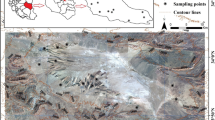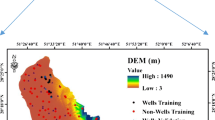Abstract
In this study, the application of four evolutionary algorithms, continuous genetic algorithm (CGA), particle swarm optimization (PSO), ant colony optimization for continuous domains (ACOR), and differential evolution (DE) were considered for training and optimization of adaptive neuro-fuzzy inference system (ANFIS) to model groundwater quality variables. At first, using correlation and sensitivity analysis, the best inputs were selected to estimate electrical conductivity (EC), sodium adsorption ratio (SAR) and total hardness (TH). After that, the quality variables were modeled by simple ANFIS and the ANFIS trained by evolutionary algorithms. Finally, the models’ performances were evaluated using determination coefficient (R2), root mean square error (RMSE), and mean absolute percentage error (MAPE) and sensitivity analysis. Results indicated that: 1) All the suggested algorithms improved the ANFIS performance in the modeling of EC and TH. Also, in SAR, CGA and PSO had a better performance than existing algorithms of ANFIS. 2) CGA with the most appropriate results, was the best algorithm in improving ANFIS performance for modeling the groundwater quality variables such that the amounts of R2, RMSE, and MAPE were improved by 0.14, 35.4, and 0.59 for TH, by 0.13, 226 (μmho Cm−1), 2.16 for EC, and by 0.15, 690, and 19.04 for SAR, respectively. 3) Sensitivity analysis showed that the results obtained by correlation analysis was dependable and could be used as a primary step in choosing the best input data for prediction of groundwater quality variables.




Similar content being viewed by others
References
Abu-Khalaf N, Khayat S, Natsheh B (2013) Multivariate data analysis to identify the groundwater pollution sources in Tulkarm area/Palestine. Sci Technol 3(4):99–104
Akrami SA, El-Shafie A, Jaafar O (2013) Improving rainfall forecasting efficiency using modified adaptive neuro-fuzzy inference system (MANFIS). Water Resour Manag 27(9):3507–3523
Anand A, Suganthi L (2017) Forecasting of electricity demand by hybrid ANN-PSO models. Int J of Ene Opt and Eng (IJEOE) 6(4):66–83
Ayers RS, Westcot DW (1994) Water quality for agriculture. FAO irrig and drain paper. 29 Rev 1
Azad A, Karami H, Farzin S, Saeedian A, Kashi H, Sayyahi F (2018a) Prediction of water quality parameters using ANFIS optimized by intelligence algorithms (case study: Gorganrood River). KSCE J Civ Eng 22(7):2206–2213
Azad A, Kashi H, Farzin S, Singh VP, Kisi O, Karami H, Sanikhani H (2018b) Novel approaches for air temperature prediction: comparison of four hybrid evolutionary fuzzy models. Meteorol Appl. https://doi.org/10.1002/met.1736
Azadi Moghaddam M, Golmezerji R, Kolahan F (2017) Simultaneous optimization of joint edge geometry and process parameters in gas metal arc welding using integrated ANN-PSO approach. Scientia Iranica 24(1):260–273
Bedekar PP, Bhide SR (2011) Optimum coordination of overcurrent relay timing using continuous genetic algorithm. Expert Syst Appl 38(9):11286–11292
Chau KW (2007) Application of a PSO-based neural network in analysis of outcomes of construction claims. Autom Constr 16(5):642–646
Chen W, Panahi M, Pourghasemi HR (2017) Performance evaluation of GIS-based new ensemble data mining techniques of adaptive neuro-fuzzy inference system (ANFIS) with genetic algorithm (GA), differential evolution (DE), and particle swarm optimization (PSO) for landslide spatial modelling. CATENA 157:310–324
Dorigo M (1992) Optimization, learning and natural algorithms Ph. D. Thesis, Politecnico di Milano, Italy
El-Shafie A, Jaafer O, Akrami SA (2011) Adaptive neuro-fuzzy inference system based model for rainfall forecasting in Klang River. Malaysia Int J of Phys Sci 6(12):2875–2888
Haznedar B, Kalinli A (2016) Training ANFIS using genetic algorithm for dynamic systems dentification. Adv Tech and Sci (IJIASE) 4:44–47
He Z, Wen X, Liu H, Du J (2014) A comparative study of artificial neural network, adaptive neuro fuzzy inference system and support vector machine for forecasting river flow in the semiarid mountain region. J Hydrol 509:379–386
Holland JH (1975) Adaption in natural and artificial systems. The University of Michigan Press, Ann Arbor
Jalalkamali A (2015) Using of hybrid fuzzy models to predict spatiotemporal groundwater quality parameters. Earth Sci Inf 8(4):885–894
Jang JS (1993) ANFIS: adaptive-network-based fuzzy inference system. IEEE Trans Syst, Man Cybern 23(3):665–685
Kennedy J, Eberhart RC (1995) Particle swarm optimization. Proce of IEEE int conf on neutral net, Perth, Australia 1942–1948
Kheradpisheh Z, Talebi A, Rafati L, Ghaneian MT, Ehrampoush MH (2015) Groundwater quality assessment using artificial neural network: a case study of Bahabad plain, Yazd, Iran. Desert 20(1):65–71
Kisi O, Keshavarzi A, Shiri J, Zounemat-Kermani M, Omran ESE (2017) Groundwater quality modeling using neuro-particle swarm optimization and neuro-differential evolution techniques. Hydrol Res. https://doi.org/10.2166/nh.2017.206
Mekanik F, Imteaz MA, Talei A (2016) Seasonal rainfall forecasting by adaptive network-based fuzzy inference system (ANFIS) using large scale climate signals. Clim Dyn 46(9–10):3097–3111
Mirrashid M (2014) Earthquake magnitude prediction by adaptive neuro-fuzzy inference system (ANFIS) based on fuzzy C-means algorithm. Nat Hazards 74(3):1577–1593
Mousavi SF, Amiri MJ (2012) Modelling nitrate concentration of groundwater using adaptive neural-based fuzzy inference system. Soil Water Resour 7(2):73–83
Najah A, El-Shafie A, Karim OA, El-Shafie AH (2014) Performance of ANFIS versus MLP-NN dissolved oxygen prediction models in water quality monitoring. Environ Sci Pollut Res 21(3):1658–1670
Peyghami MR, Khanduzi R (2013) Novel MLP neural network with hybrid tabu search algorithm. Neural Network World 3(13):255–270
Rezakazemi M, Dashti A, Asghari M, Shirazian S (2017) H2-selective mixed matrix membranes modeling using ANFIS, PSO-ANFIS, GA-ANFIS. Int J Hydrog Energy 42(22):15211–15225
Ruben GB, Zhang K, Bao H, Ma X (2018) Application and sensitivity analysis of artificial neural network for prediction of chemical oxygen demand. Water Resour Manag 32(1):273–283
Selvi V, Umarani DR (2010) Comparative analysis of ant colony and particle swarm optimization techniques. Int J Comput Appl 5(4):0975–8887
Socha K, Dorigo M (2008) Ant colony optimization for continuous domains. Eur J Oper Res 185(3):1155–1173
Storn R, Price K (1997) Differential evolution–a simple and efficient heuristic for global optimization over continuous spaces. J Glob Optim 11(4):341–359
Tabari MMR (2016) Prediction of river runoff using fuzzy theory and direct search optimization. Arab J Sci Eng 41(10):4039–4051
Zadeh LA (1965) Fuzzy sets. Inf Control 8(3):338–353
Acknowledgements
The authors would like to thank the Isfahan Regional Water Authority for providing the necessary data to carry out this investigation.
Author information
Authors and Affiliations
Corresponding author
Ethics declarations
Conflict of Interest
None.
Additional information
Publisher’s Note
Springer Nature remains neutral with regard to jurisdictional claims in published maps and institutional affiliations.
Rights and permissions
About this article
Cite this article
Kisi, O., Azad, A., Kashi, H. et al. Modeling Groundwater Quality Parameters Using Hybrid Neuro-Fuzzy Methods. Water Resour Manage 33, 847–861 (2019). https://doi.org/10.1007/s11269-018-2147-6
Received:
Accepted:
Published:
Issue Date:
DOI: https://doi.org/10.1007/s11269-018-2147-6




